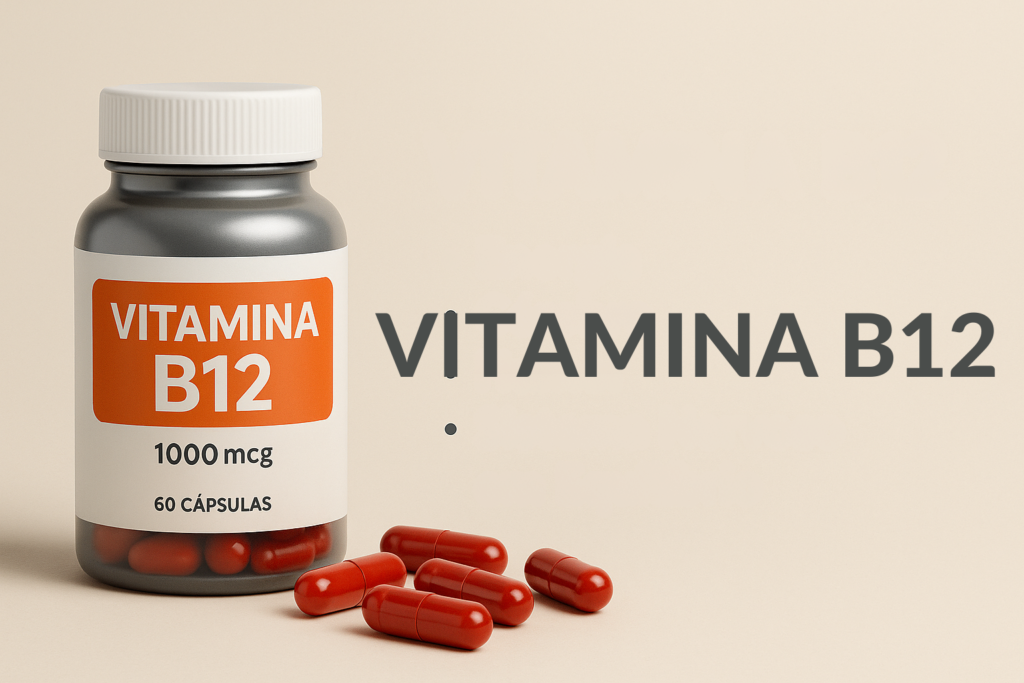Vitamin B12 is one of the most important nutrients for the optimal functioning of both body and mind. It plays a key role in essential processes such as energy production, red blood cell formation, nervous system protection, and neurotransmitter synthesis.
Despite its crucial role, B12 deficiency is more common than most people realize—especially among vegetarians, vegans, the elderly, and individuals with digestive issues.
In this article, you’ll learn what vitamin B12 is, how it works in the body, the main signs of deficiency, and how to use supplementation safely and effectively.
What Is Vitamin B12?
Vitamin B12, also known as cobalamin, is a water-soluble B-complex vitamin that must be obtained through food or supplements, as the body cannot produce it on its own.
It is essential for:
- Energy production (ATP)
- Formation and maintenance of neurons and the myelin sheath
- DNA and RNA synthesis
- Protein and fat metabolism
- Red blood cell (RBC) formation
- Synthesis of neurotransmitters such as serotonin and dopamine
Benefits of Vitamin B12 Supplementation
1. More Energy, Less Fatigue
B12 is involved in ATP production in the mitochondria. A deficiency can cause:
- Unexplained fatigue
- Lack of stamina
- Muscle weakness
- Slow post-workout recovery
With proper supplementation, increased physical and mental energy is often noticeable within weeks.
2. Nervous System and Memory Support
B12 protects the myelin sheath that surrounds nerves. It also plays a key role in neurotransmitter synthesis, directly impacting:
- Mental clarity
- Concentration
- Short- and long-term memory
- Prevention of neurological decline
3. Mood Improvement and Depression Prevention
Vitamin B12 influences the production of serotonin and dopamine, neurotransmitters linked to well-being. Low levels can lead to:
- Irritability
- Anxiety
- Low motivation
- Mild to moderate depression
Proper supplementation can help balance mood and boost emotional well-being.
4. Red Blood Cell Formation
Along with folic acid, B12 is essential for RBC production. Deficiency can cause a specific type of anemia (megaloblastic anemia), with symptoms such as:
- Paleness
- Excessive fatigue
- Shortness of breath during exertion
5. Support During Pregnancy and Fetal Development
During pregnancy, B12 is critical for:
- Neural tube development in the baby
- Brain and neurological formation
- Prevention of birth defects
Common Signs of Vitamin B12 Deficiency
- Frequent fatigue
- Mental sluggishness
- Irritability, anxiety, or unexplained sadness
- Recent memory loss
- Tingling in hands or feet
- Pale skin or sore tongue
- Hair loss and brittle nails
Note: Deficiency may go undiagnosed for a long time as symptoms are subtle at first.
Who’s Most at Risk of Deficiency?
- Vegetarians and vegans (B12 is found only in animal-derived foods)
- Elderly individuals (due to decreased absorption)
- People taking omeprazole, metformin, or antacids regularly
- Those with atrophic gastritis, intestinal diseases, or who have undergone bariatric surgery
Common Forms of B12 in Supplements
- Cyanocobalamin – the most common synthetic form, stable and effective
- Methylcobalamin – the active form, best for brain and nervous system support
- Hydroxocobalamin – slow-release form
- Adenosylcobalamin – mitochondrial form, supports energy production
Tip: Look for supplements with methylcobalamin for higher bioavailability and neurological support.
Recommended Dosage
- Healthy adults: 2.4 mcg/day (minimum)
- Functional supplementation: 250–1000 mcg/day, especially for prevention or deficiency
B12 is water-soluble, so excess amounts are excreted in urine and considered safe.
Best Ways to Take Vitamin B12
- Sublingual tablets or capsules
- Sublingual drops (fast absorption)
- Injections (for severe cases, under professional guidance)
Best taken in the morning to boost energy throughout the day.
Synergistic Combinations
- Folic Acid (B9): works together in DNA and red blood cell production
- Vitamin B6: supports amino acid metabolism
- Magnesium: supports the nervous system and cellular energy
- Vitamin C: improves B12 absorption in the gut
Side Effects and Precautions
- B12 is extremely safe
- High doses may rarely cause mild acne or discomfort
- People with chronic kidney disease or polycythemia should consult a healthcare provider
Final Thoughts
Vitamin B12 is essential for a clear mind, energized body, and healthy nervous system. Its silent deficiency can compromise everything from mood to memory—making strategic capsule supplementation a powerful ally for modern vitality.
If you’re looking for more focus, energy, and emotional balance, B12 might be the missing piece in your wellness routine.
